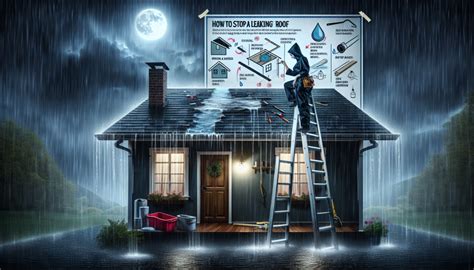How To Stop A Leaking Roof During Heavy Rains
Ronan Farrow
Apr 02, 2025 · 3 min read

Table of Contents
How to Stop a Leaking Roof During Heavy Rains: Emergency Solutions
A leaking roof during a heavy downpour is a homeowner's nightmare. Water damage can quickly escalate, leading to costly repairs and potential health hazards. While professional roof repair is ideal, sometimes you need immediate solutions to prevent further damage until help arrives. This guide provides emergency steps to stop a leaking roof during heavy rains.
Assessing the Situation: Before You Start
Before attempting any repairs, prioritize safety. Turn off any electricity in the affected area to prevent electric shock. Wear protective gear like waterproof gloves and boots to avoid injury. If the leak is substantial or you feel unsafe, call a professional roofer immediately.
Locating the Leak
Pinpointing the leak's source is crucial. Check your attic for visible water stains or dripping. If you can't locate it easily from inside, carefully examine your roof's exterior from a safe distance for signs of damage like missing shingles, cracks, or holes. Remember: the leak might not be directly above the water stain inside; water can travel along beams and rafters.
Temporary Fixes for a Leaking Roof
These are emergency fixes; they're not permanent solutions and shouldn't replace professional roof repair.
1. Using Tarps for Immediate Protection
Tarps are a quick, readily available solution. Securely cover the affected area, ensuring the tarp overlaps the damaged area and extends beyond it to prevent water from seeping underneath. Weight down the edges with heavy objects like bricks, sandbags, or even furniture (if safe to do so). This prevents the tarp from being blown away by strong winds.
2. Bucket Brigade: Collecting Leaking Water
If you can't immediately cover the leak, place buckets to collect the leaking water. Direct the flow of water into the buckets to prevent water damage to your belongings. Regularly empty these buckets to prevent overflow.
3. Caulk as a Short-Term Sealant
For smaller leaks, such as minor cracks in flashing around pipes or chimneys, you can use exterior-grade caulk as a temporary sealant. Apply it generously and allow it to dry completely before subjecting it to further rain. This is merely a temporary fix and will require professional repair later.
4. Utilizing Sealant Tape: A Quick Fix Option
Sealant tape, specifically designed for roofing repairs, can offer a short-term solution for small leaks or gaps in shingles. Ensure the surface is clean and dry before applying the tape. Press firmly to create a tight seal.
Post-Storm Actions: After the Rain Stops
Once the storm passes, thoroughly inspect the damage. Take pictures of the affected areas to show your insurance company or roofer. Remove the temporary fixes and assess the extent of the damage. Schedule professional roof repairs as soon as possible. Don't delay – even small leaks can cause significant structural damage over time.
Preventing Future Roof Leaks
Regular roof maintenance is essential for preventing leaks. This includes:
- Annual inspections: Check for missing or damaged shingles, cracked flashing, and clogged gutters.
- Gutter cleaning: Keep gutters free from debris to prevent water buildup and overflow.
- Professional inspections: Consult with a roofing professional for a thorough assessment and preventative measures.
By following these steps, you can effectively manage a leaking roof during heavy rains and minimize potential damage while awaiting professional repair. Remember, safety is paramount, and a professional assessment is always recommended for lasting solutions.
Featured Posts
Also read the following articles
| Article Title | Date |
|---|---|
| How To Remove Purge Valve Hose | Apr 02, 2025 |
| How To Test The Ignition Control Module | Apr 02, 2025 |
| How To Rebuild A Saginaw 4 Speed Transmission | Apr 02, 2025 |
| How To Read Without Hurting Your Neck | Apr 02, 2025 |
| How To Tone Down A Bright Gold Frame | Apr 02, 2025 |
Latest Posts
-
How Can I Get A Work Permit In South Africa
Apr 03, 2025
-
How Can I Get A Speeding Ticket Reduced
Apr 03, 2025
-
How Can I Get A Free Government Phone In Florida
Apr 03, 2025
-
How Can I Find Out If A Motorcycle Is Stolen
Apr 03, 2025
-
How Can I Boost My Cell Signal In Rural Areas
Apr 03, 2025
Thank you for visiting our website which covers about How To Stop A Leaking Roof During Heavy Rains . We hope the information provided has been useful to you. Feel free to contact us if you have any questions or need further assistance. See you next time and don't miss to bookmark.
